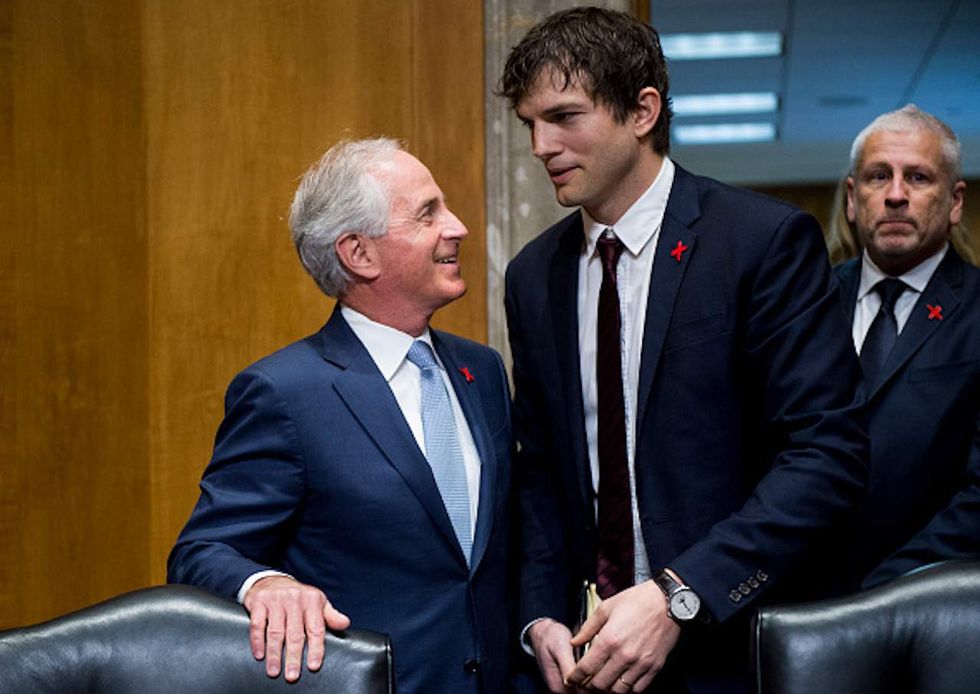Ashton Kutcher is sticking to his day job — and no, that’s not acting.
As the chairman and co-founder of Thorn: Digital Defenders of Children — a technology company that works to eradicate child exploitation — Kutcher passionately testified before the Senate Committee on Foreign Relations Wednesday in an effort to help end so-called modern slavery and trafficking.
“I’m here today to defend the right to pursue happiness. It’s a simple notion — the right to pursue happiness,” Kutcher said in his opening remarks. “The right to pursue happiness for so many is stripped away. It’s raped. It’s abused. It’s taken by force, fraud or coercion. It is sold for the momentary happiness of another.”
As Kutcher, the father of two young children, detailed in his testimony, an estimated 27 million people worldwide, including children, are trapped in forced labor and sexual exploitation.
Through his work with Thorn, Kutcher detailed a number of horrific and heartbreaking scenarios he’s witnessed.
“I’ve been on FBI raids where I’ve seen things that no person should ever see. I’ve seen video content of a child that’s the same age as mine being raped by an American man in Cambodia,” an emotional Kutcher said. “And this child was so conditioned by her environment that she thought she was engaging in play.”
But Kutcher also told of a 15-year-old girl who was raped, beaten and sold for sex just within hours of physically meeting a man who she had met online.
The only thing unusual about her story, Kutcher said, was that she was found and returned back to her family in three days thanks to software — a tool called Spotlight — developed by Thorn. The software, Kutcher said, is available to be used by law enforcement.
During his testimony, Kutcher praised entrepreneurs and companies who “take risks” when combatting human trafficking and lifted those efforts up as a model.
Responding to a question from Sen. Bob Corker (R-Tenn.), the committee's chairman, on advice to help eradicate the issue, Kutcher said:
As I work with entrepreneurs across the country, the extraordinary thing is they’re not afraid to fail. It’s unbelievable. They just go for it, like, full-blown. So if you deploy the capital in a way that allows people to fail but also in a way to allow people to massively succeed, you may find that you have much greater outcomes than you do by making safe choices with the deployment of the capital. Oftentimes the greatest ideas come when those people aren’t afraid to fail.
Kutcher argued that the technological tools to combat trafficking — like the lifesaving ones his organization has developed — is “best built in the private sector.”
He said:
The reason why I think they are best built in the private sector is we’re willing to take those risks, and we’re willing to create that accountability.
Now when we get to the level where it’s becoming a fundamental institution to solving the problem, and we have 4,000 law enforcement officials, 900 agencies using the tool, well, now we’ve shown its effectiveness, we’ve shown it can be measured, we’ve shown that it can be improved and at that point in time it becomes incumbent upon the public sector to step up. We give our tools away for free.
[...]
So I think they’re best incubated in the private sector, but at a certain point, the public sector needs to recognize that tool.
Kutcher also took issue with the phrase “modern slavery” for minimizing what's actually happening.
“It’s slavery," he said simply.
“I think we do a disservice to the people who were slaves in this country for so long, and the oppression that they felt in the years following by not calling it what it is,” Kutcher argued.
“And if we just call it slavery, from a nomenclature perspective, and acknowledge the fact that just because a person is of a different nationality or that they’re being sold for sex makes it something different so that we can pat ourselves on the back and say, ‘Oh well we’ve abolished this and done all that we can,’ I think that that will have a giant impact because I think it motivates people emotionally to actually build things,” he added.
Attending the hearing might be “one of the greatest honors” in Kutcher's life, he said:
As a young man raised and brought up in the public school system, I pledged my allegiance to that flag every single day. And maybe one of the greatest honors of my life today is to be here and leverage the work that I’ve done as testimony that may in some way benefit the nation that I love.
Wednesday's hearing — which also included testimony from Human Rights First President Elisa Massimino — was just a little more than one week from the fifth annual Shine a Light on Slavery Day, Feb. 23.



